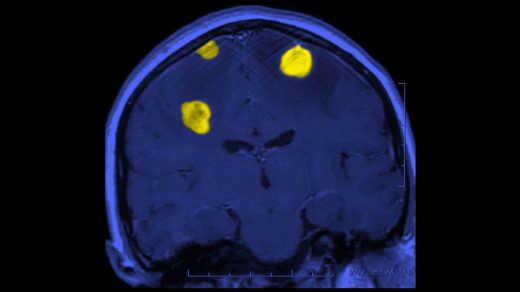A specific type of diabetes medication has been associated with a lower risk of dementia, Alzheimer’s and Parkinson’s disease in a study published today.
The South Korean study followed 358,862 participants with type 2 diabetes and found that those taking sodium-glucose cotransporter-2 (SGLT2) inhibitors had a 22 percent lower risk of developing dementia or Parkinson’s compared with type 2 diabetics taking different medication.
“I was both intrigued and delighted to discover that this finding underscores the potential of SGLT2 inhibitors, a treatment for type 2 diabetes, as an effective option for reducing the risk of neurodegenerative diseases,” study author Dr. Minyoung Lee, from Yonsei University College of Medicine, told Newsweek.
An estimated 6.2 million U.S. adults aged 65 and older had dementia in 2021, according to data published in scientific journal Alzheimer’s & Dementia, and that number continues to grow; the same paper predicted it could be 13.8 million by 2060.
“Due to the global trend of an aging population, the number of diabetic patients with neurodegenerative diseases is on the rise,” said Lee. “Additionally, diabetes itself increases the risk of developing neurodegenerative diseases, hence there is a growing need for therapeutic and preventive approaches in this diabetic population.”
Lee said this study could help individuals with type 2 diabetes choose the most beneficial oral medication for them, bearing in mind their high risk of developing conditions such as dementia and Parkinson’s.
SGLT2 inhibitors are drugs that lower blood sugar levels by causing the kidneys to remove sugar from the body through urine.
Lee and colleagues studied people with type 2 diabetes who started on medication between 2014 and 2019 in South Korea.
Two groups of people were recruited: those taking SGLT2 inhibitors and those taking other oral diabetes drugs, such as metformin. Both groups contained people of similar ages, with similar levels of health complications.
Researchers followed participants for up to five years to see whether they developed dementia or Parkinson’s disease—and 6,837 people did.
After researchers adjusted their data for factors that could affect the risk of dementia or Parkinson’s disease—such as complications from diabetes and medications, age or kidney function—they found that SGLT2 inhibitor use was associated with a 21 percent risk of dementia overall, and 22 percent lower risk of developing any dementia or Parkinson’s.
Specifically, the group taking SGLT2 medication showed a 20 percent lower risk of developing Alzheimer’s disease, a 20 percent reduced risk of developing Parkinson’s and a 30 percent decreased risk of developing vascular dementia.

A portrait of a senior man touching his forehead. Type 2 diabetes is linked with a higher risk of neurodegenerative diseases, such as vascular dementia, Alzheimer’s and Parkinson’s disease.
PIKSEL/Getty Images
“An interesting finding from this study is that SGLT2 inhibitor, a medication for diabetes, have shown a reduction in risk not only for Alzheimer’s disease but also for other types of neurodegenerative diseases such as vascular dementia and Parkinson’s disease,” said Lee.
Lee told Newsweek that the benefits of these drugs might be because, in removing sugar from the body through urine, it interacts with the body’s metabolism, improving the function of mitochondria and causing an increase of ketones in the body.
Ketones are an alternative energy source to glucose, made from fat instead of sugar, and have become more well-known in recent years because of the ketogenic diet, which aims to make the body switch to producing and using ketones as its primary fuel, rather than glucose.
Previous research has identified that ketones may be beneficial in preventing or treating neurological disorders.
“These results suggest that changes in energy metabolism, as observed in type 2 diabetes, could represent a common mechanism that pervades various neurodegenerative diseases,” said Lee.
There were a variety of limitations to this study. For instance, the study was quite short; participants on non-SGLT2 inhibitor medication were followed for an average of four years, and those who were taking it were followed for an average of just two years.
This means the study cannot grasp the long-term impact of taking these various diabetes medications.
In the paper, the authors speculated that the use of SGLT2 inhibitors was more likely to delay the progression of dementia than prevent it completely, so many of the participants may have developed the disease later on.
The scientists also didn’t differentiate between participants taking insulin to control their blood sugars and those not doing so, but this can make a significant difference to dementia risk, as relying on insulin to deal with blood sugars can lead to more frequent blood sugar spikes, therefore raising the risk of dementia.
All the study participants were Asian too, which means the results may have been different among other ethnicities.
Lee told Newsweek that it was hoped further research would deepen scientific understanding of neurodegenerative diseases as well as gain further insight into how diabetes and its management may interact with them.
This study was published in the online issue of Neurology, the medical journal of the American Academy of Neurology (AAN).
Do you have a tip on a food story that Newsweek should be covering? Is there a nutrition concern that’s worrying you? Let us know via [email protected]. We can ask experts for advice, and your story could be featured in Newsweek.
References
Kim, H. K., Biessels, G. J., Yu, M. H., Hong, N., Lee, Y.-H., Lee, B.-W., Kang, E. S., Cha, B.-S., Lee, E. J., & Lee, M. (2024). SGLT2 Inhibitor Use and Risk of Dementia and Parkinson Disease Among Patients With Type 2 Diabetes. Neurology, 103. http://dx.doi.org/10.1212/WNL.0000000000209805
Anonymous (2021). 2021 Alzheimer’s disease facts and figures, Alzheimer’s & Dementia 17(3): 327-406. https://doi.org/10.1002/alz.12328



